Evaluating the Impact of New Normal on Organisational Behaviour
VerifiedAdded on 2023/06/08
|16
|5284
|157
Report
AI Summary
This report provides an analysis of the impact of the 'new normal' on organisational behaviour, focusing on aspects such as organisational power, politics, and culture, and how they influence individual and team performance. It evaluates motivational theories and techniques, including Maslow's hierarchy of needs, to understand how organisational objectives can be achieved. The report also explores the characteristics of effective teams and the importance of team development theories. Furthermore, it examines the philosophies and concepts of organisational behaviour, emphasizing how these elements encourage desired behaviours within organisations like HSBC and Amazon. The analysis considers both positive and negative impacts of organisational politics and power dynamics, providing a comprehensive overview of how organisations can navigate the challenges and opportunities presented by the evolving work environment.
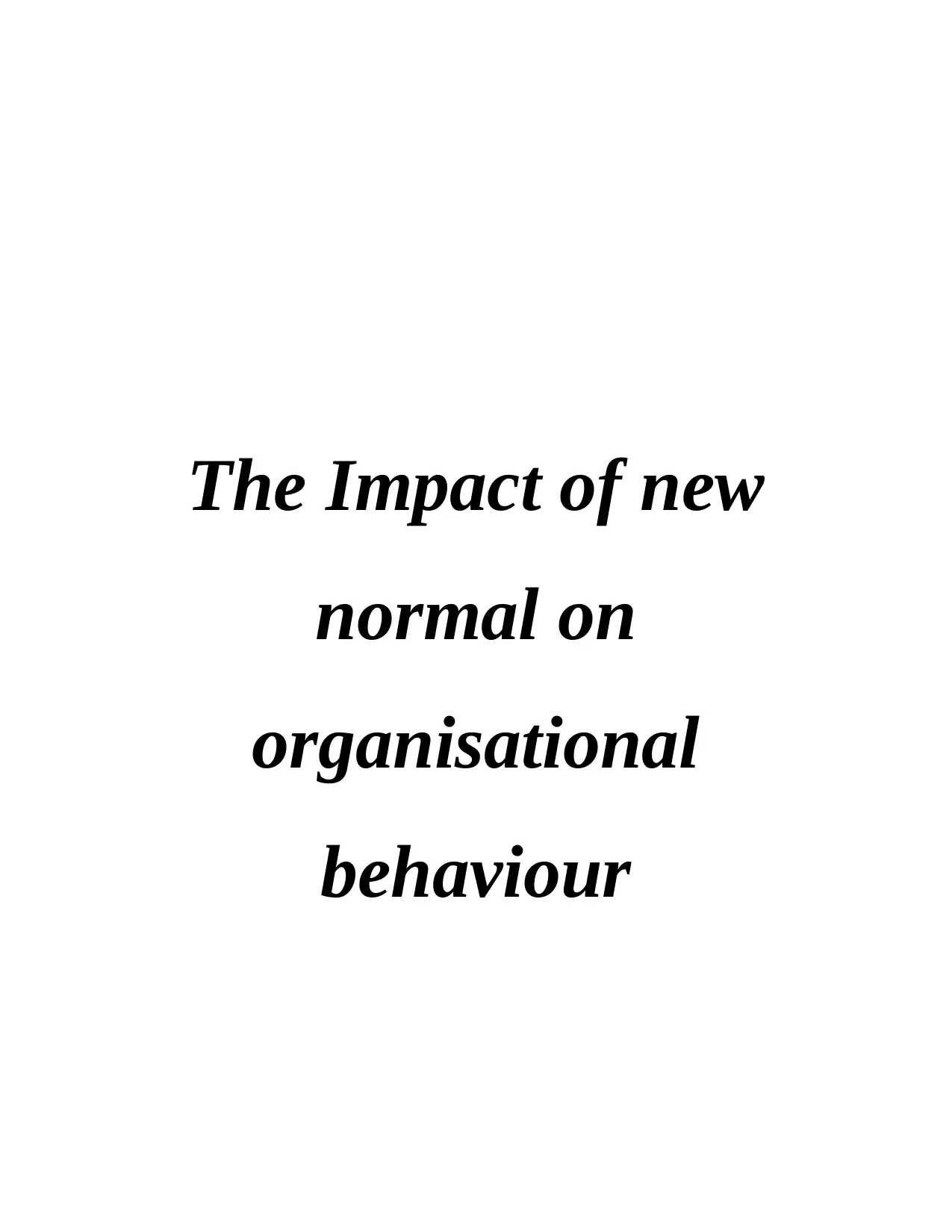
The Impact of new
normal on
organisational
behaviour
normal on
organisational
behaviour
Paraphrase This Document
Need a fresh take? Get an instant paraphrase of this document with our AI Paraphraser
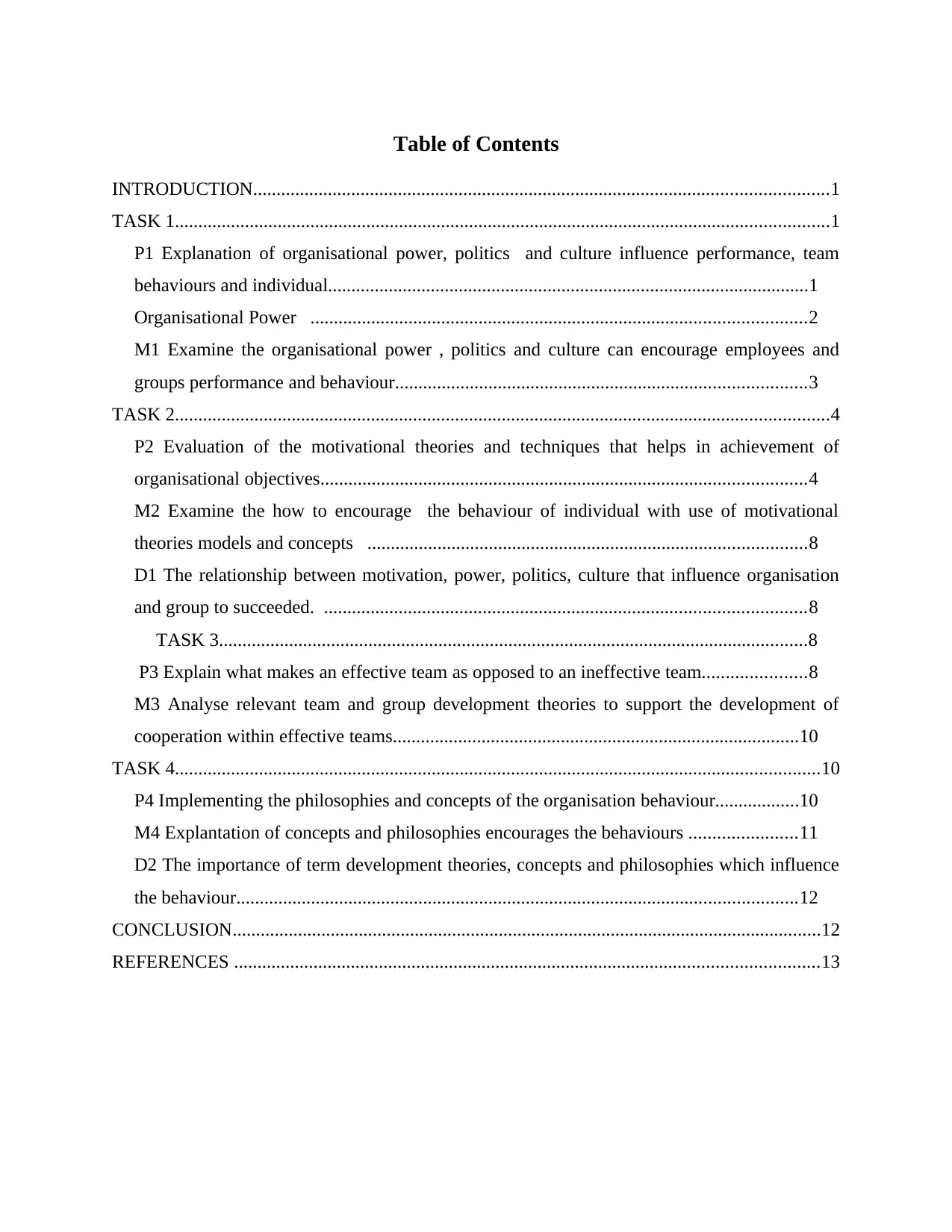
Table of Contents
INTRODUCTION...........................................................................................................................1
TASK 1............................................................................................................................................1
P1 Explanation of organisational power, politics and culture influence performance, team
behaviours and individual.......................................................................................................1
Organisational Power ..........................................................................................................2
M1 Examine the organisational power , politics and culture can encourage employees and
groups performance and behaviour........................................................................................3
TASK 2............................................................................................................................................4
P2 Evaluation of the motivational theories and techniques that helps in achievement of
organisational objectives........................................................................................................4
M2 Examine the how to encourage the behaviour of individual with use of motivational
theories models and concepts ..............................................................................................8
D1 The relationship between motivation, power, politics, culture that influence organisation
and group to succeeded. .......................................................................................................8
TASK 3..............................................................................................................................8
P3 Explain what makes an effective team as opposed to an ineffective team......................8
M3 Analyse relevant team and group development theories to support the development of
cooperation within effective teams.......................................................................................10
TASK 4..........................................................................................................................................10
P4 Implementing the philosophies and concepts of the organisation behaviour..................10
M4 Explantation of concepts and philosophies encourages the behaviours .......................11
D2 The importance of term development theories, concepts and philosophies which influence
the behaviour........................................................................................................................12
CONCLUSION..............................................................................................................................12
REFERENCES .............................................................................................................................13
INTRODUCTION...........................................................................................................................1
TASK 1............................................................................................................................................1
P1 Explanation of organisational power, politics and culture influence performance, team
behaviours and individual.......................................................................................................1
Organisational Power ..........................................................................................................2
M1 Examine the organisational power , politics and culture can encourage employees and
groups performance and behaviour........................................................................................3
TASK 2............................................................................................................................................4
P2 Evaluation of the motivational theories and techniques that helps in achievement of
organisational objectives........................................................................................................4
M2 Examine the how to encourage the behaviour of individual with use of motivational
theories models and concepts ..............................................................................................8
D1 The relationship between motivation, power, politics, culture that influence organisation
and group to succeeded. .......................................................................................................8
TASK 3..............................................................................................................................8
P3 Explain what makes an effective team as opposed to an ineffective team......................8
M3 Analyse relevant team and group development theories to support the development of
cooperation within effective teams.......................................................................................10
TASK 4..........................................................................................................................................10
P4 Implementing the philosophies and concepts of the organisation behaviour..................10
M4 Explantation of concepts and philosophies encourages the behaviours .......................11
D2 The importance of term development theories, concepts and philosophies which influence
the behaviour........................................................................................................................12
CONCLUSION..............................................................................................................................12
REFERENCES .............................................................................................................................13
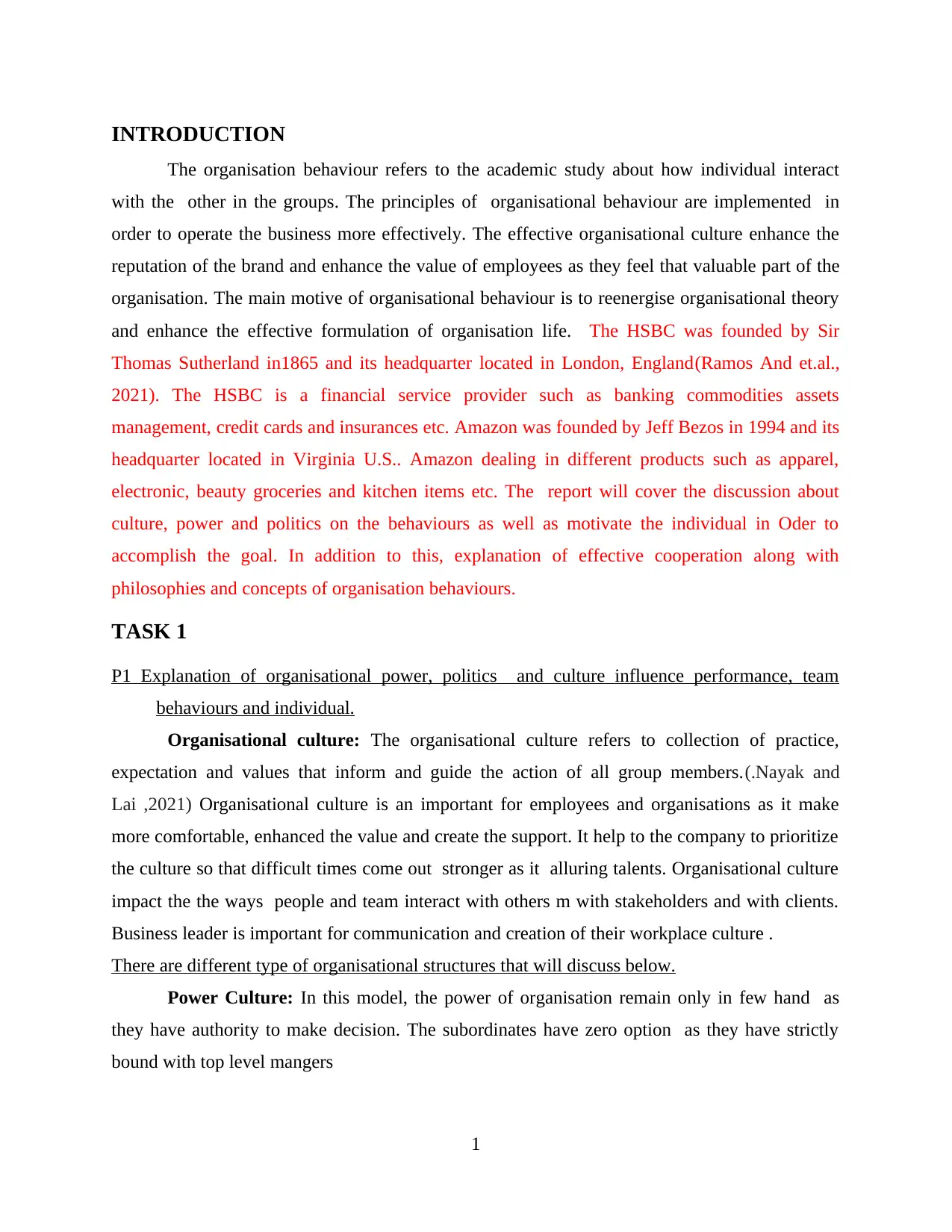
INTRODUCTION
The organisation behaviour refers to the academic study about how individual interact
with the other in the groups. The principles of organisational behaviour are implemented in
order to operate the business more effectively. The effective organisational culture enhance the
reputation of the brand and enhance the value of employees as they feel that valuable part of the
organisation. The main motive of organisational behaviour is to reenergise organisational theory
and enhance the effective formulation of organisation life. The HSBC was founded by Sir
Thomas Sutherland in1865 and its headquarter located in London, England(Ramos And et.al.,
2021). The HSBC is a financial service provider such as banking commodities assets
management, credit cards and insurances etc. Amazon was founded by Jeff Bezos in 1994 and its
headquarter located in Virginia U.S.. Amazon dealing in different products such as apparel,
electronic, beauty groceries and kitchen items etc. The report will cover the discussion about
culture, power and politics on the behaviours as well as motivate the individual in Oder to
accomplish the goal. In addition to this, explanation of effective cooperation along with
philosophies and concepts of organisation behaviours.
TASK 1
P1 Explanation of organisational power, politics and culture influence performance, team
behaviours and individual.
Organisational culture: The organisational culture refers to collection of practice,
expectation and values that inform and guide the action of all group members.(.Nayak and
Lai ,2021) Organisational culture is an important for employees and organisations as it make
more comfortable, enhanced the value and create the support. It help to the company to prioritize
the culture so that difficult times come out stronger as it alluring talents. Organisational culture
impact the the ways people and team interact with others m with stakeholders and with clients.
Business leader is important for communication and creation of their workplace culture .
There are different type of organisational structures that will discuss below.
Power Culture: In this model, the power of organisation remain only in few hand as
they have authority to make decision. The subordinates have zero option as they have strictly
bound with top level mangers
1
The organisation behaviour refers to the academic study about how individual interact
with the other in the groups. The principles of organisational behaviour are implemented in
order to operate the business more effectively. The effective organisational culture enhance the
reputation of the brand and enhance the value of employees as they feel that valuable part of the
organisation. The main motive of organisational behaviour is to reenergise organisational theory
and enhance the effective formulation of organisation life. The HSBC was founded by Sir
Thomas Sutherland in1865 and its headquarter located in London, England(Ramos And et.al.,
2021). The HSBC is a financial service provider such as banking commodities assets
management, credit cards and insurances etc. Amazon was founded by Jeff Bezos in 1994 and its
headquarter located in Virginia U.S.. Amazon dealing in different products such as apparel,
electronic, beauty groceries and kitchen items etc. The report will cover the discussion about
culture, power and politics on the behaviours as well as motivate the individual in Oder to
accomplish the goal. In addition to this, explanation of effective cooperation along with
philosophies and concepts of organisation behaviours.
TASK 1
P1 Explanation of organisational power, politics and culture influence performance, team
behaviours and individual.
Organisational culture: The organisational culture refers to collection of practice,
expectation and values that inform and guide the action of all group members.(.Nayak and
Lai ,2021) Organisational culture is an important for employees and organisations as it make
more comfortable, enhanced the value and create the support. It help to the company to prioritize
the culture so that difficult times come out stronger as it alluring talents. Organisational culture
impact the the ways people and team interact with others m with stakeholders and with clients.
Business leader is important for communication and creation of their workplace culture .
There are different type of organisational structures that will discuss below.
Power Culture: In this model, the power of organisation remain only in few hand as
they have authority to make decision. The subordinates have zero option as they have strictly
bound with top level mangers
1
⊘ This is a preview!⊘
Do you want full access?
Subscribe today to unlock all pages.

Trusted by 1+ million students worldwide
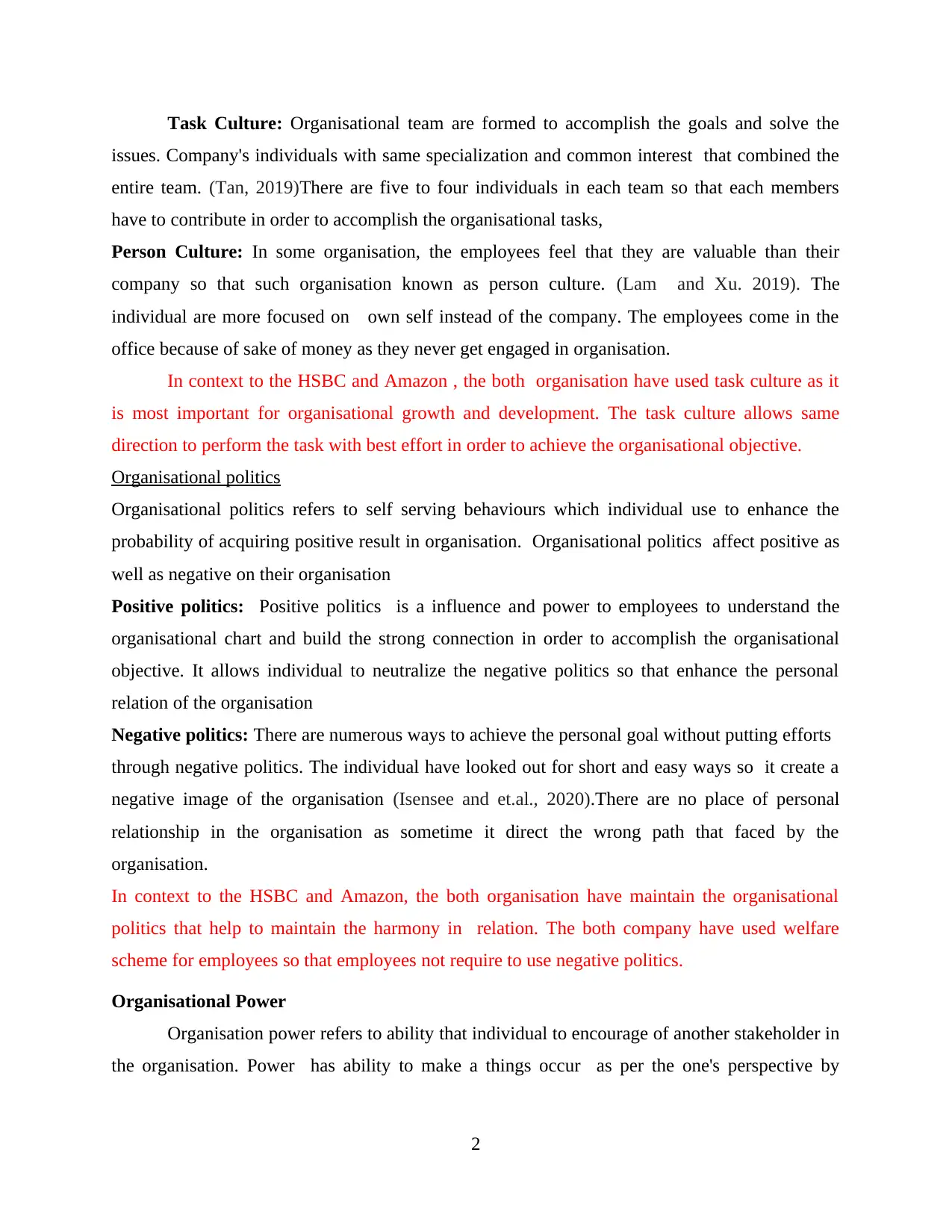
Task Culture: Organisational team are formed to accomplish the goals and solve the
issues. Company's individuals with same specialization and common interest that combined the
entire team. (Tan, 2019)There are five to four individuals in each team so that each members
have to contribute in order to accomplish the organisational tasks,
Person Culture: In some organisation, the employees feel that they are valuable than their
company so that such organisation known as person culture. (Lam and Xu. 2019). The
individual are more focused on own self instead of the company. The employees come in the
office because of sake of money as they never get engaged in organisation.
In context to the HSBC and Amazon , the both organisation have used task culture as it
is most important for organisational growth and development. The task culture allows same
direction to perform the task with best effort in order to achieve the organisational objective.
Organisational politics
Organisational politics refers to self serving behaviours which individual use to enhance the
probability of acquiring positive result in organisation. Organisational politics affect positive as
well as negative on their organisation
Positive politics: Positive politics is a influence and power to employees to understand the
organisational chart and build the strong connection in order to accomplish the organisational
objective. It allows individual to neutralize the negative politics so that enhance the personal
relation of the organisation
Negative politics: There are numerous ways to achieve the personal goal without putting efforts
through negative politics. The individual have looked out for short and easy ways so it create a
negative image of the organisation (Isensee and et.al., 2020).There are no place of personal
relationship in the organisation as sometime it direct the wrong path that faced by the
organisation.
In context to the HSBC and Amazon, the both organisation have maintain the organisational
politics that help to maintain the harmony in relation. The both company have used welfare
scheme for employees so that employees not require to use negative politics.
Organisational Power
Organisation power refers to ability that individual to encourage of another stakeholder in
the organisation. Power has ability to make a things occur as per the one's perspective by
2
issues. Company's individuals with same specialization and common interest that combined the
entire team. (Tan, 2019)There are five to four individuals in each team so that each members
have to contribute in order to accomplish the organisational tasks,
Person Culture: In some organisation, the employees feel that they are valuable than their
company so that such organisation known as person culture. (Lam and Xu. 2019). The
individual are more focused on own self instead of the company. The employees come in the
office because of sake of money as they never get engaged in organisation.
In context to the HSBC and Amazon , the both organisation have used task culture as it
is most important for organisational growth and development. The task culture allows same
direction to perform the task with best effort in order to achieve the organisational objective.
Organisational politics
Organisational politics refers to self serving behaviours which individual use to enhance the
probability of acquiring positive result in organisation. Organisational politics affect positive as
well as negative on their organisation
Positive politics: Positive politics is a influence and power to employees to understand the
organisational chart and build the strong connection in order to accomplish the organisational
objective. It allows individual to neutralize the negative politics so that enhance the personal
relation of the organisation
Negative politics: There are numerous ways to achieve the personal goal without putting efforts
through negative politics. The individual have looked out for short and easy ways so it create a
negative image of the organisation (Isensee and et.al., 2020).There are no place of personal
relationship in the organisation as sometime it direct the wrong path that faced by the
organisation.
In context to the HSBC and Amazon, the both organisation have maintain the organisational
politics that help to maintain the harmony in relation. The both company have used welfare
scheme for employees so that employees not require to use negative politics.
Organisational Power
Organisation power refers to ability that individual to encourage of another stakeholder in
the organisation. Power has ability to make a things occur as per the one's perspective by
2
Paraphrase This Document
Need a fresh take? Get an instant paraphrase of this document with our AI Paraphraser
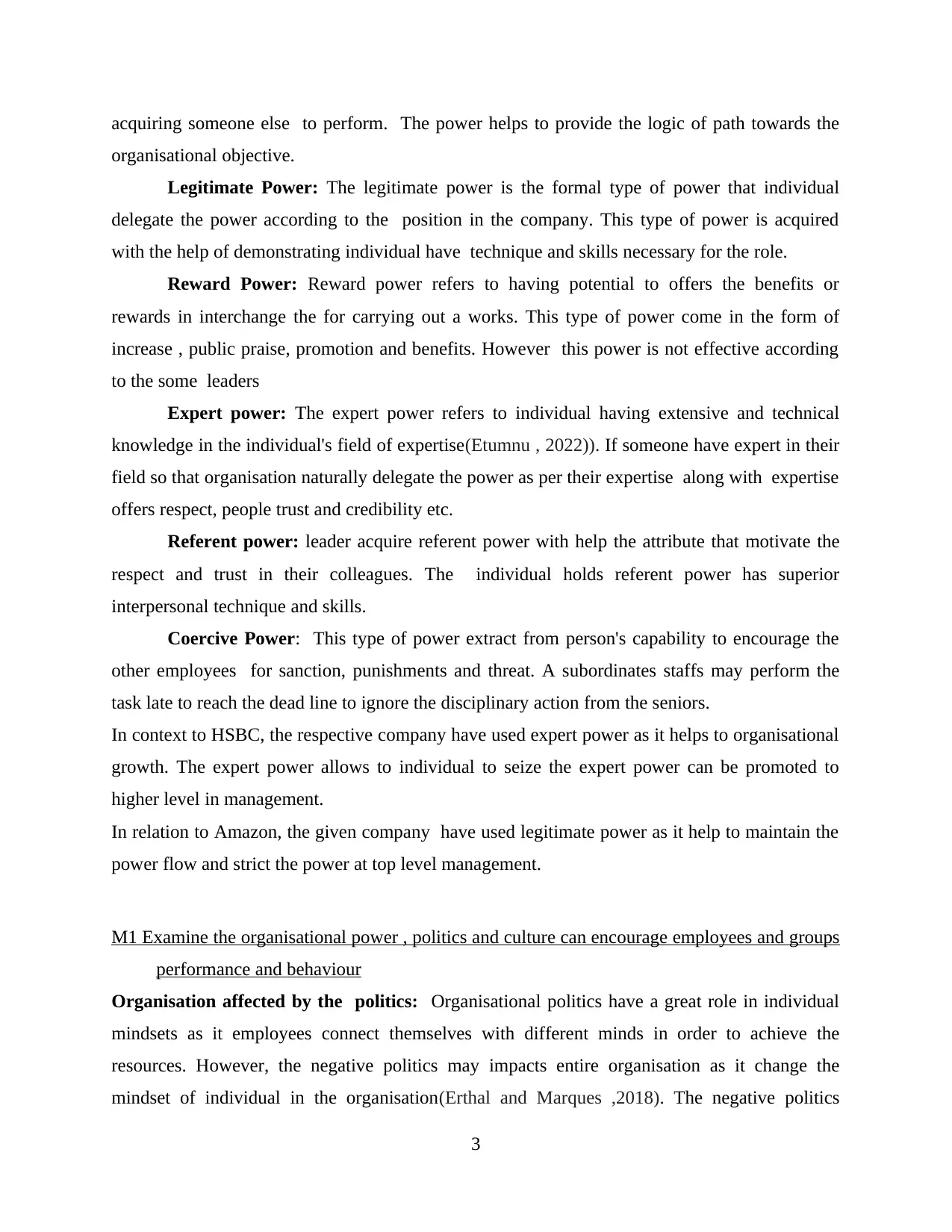
acquiring someone else to perform. The power helps to provide the logic of path towards the
organisational objective.
Legitimate Power: The legitimate power is the formal type of power that individual
delegate the power according to the position in the company. This type of power is acquired
with the help of demonstrating individual have technique and skills necessary for the role.
Reward Power: Reward power refers to having potential to offers the benefits or
rewards in interchange the for carrying out a works. This type of power come in the form of
increase , public praise, promotion and benefits. However this power is not effective according
to the some leaders
Expert power: The expert power refers to individual having extensive and technical
knowledge in the individual's field of expertise(Etumnu , 2022)). If someone have expert in their
field so that organisation naturally delegate the power as per their expertise along with expertise
offers respect, people trust and credibility etc.
Referent power: leader acquire referent power with help the attribute that motivate the
respect and trust in their colleagues. The individual holds referent power has superior
interpersonal technique and skills.
Coercive Power: This type of power extract from person's capability to encourage the
other employees for sanction, punishments and threat. A subordinates staffs may perform the
task late to reach the dead line to ignore the disciplinary action from the seniors.
In context to HSBC, the respective company have used expert power as it helps to organisational
growth. The expert power allows to individual to seize the expert power can be promoted to
higher level in management.
In relation to Amazon, the given company have used legitimate power as it help to maintain the
power flow and strict the power at top level management.
M1 Examine the organisational power , politics and culture can encourage employees and groups
performance and behaviour
Organisation affected by the politics: Organisational politics have a great role in individual
mindsets as it employees connect themselves with different minds in order to achieve the
resources. However, the negative politics may impacts entire organisation as it change the
mindset of individual in the organisation(Erthal and Marques ,2018). The negative politics
3
organisational objective.
Legitimate Power: The legitimate power is the formal type of power that individual
delegate the power according to the position in the company. This type of power is acquired
with the help of demonstrating individual have technique and skills necessary for the role.
Reward Power: Reward power refers to having potential to offers the benefits or
rewards in interchange the for carrying out a works. This type of power come in the form of
increase , public praise, promotion and benefits. However this power is not effective according
to the some leaders
Expert power: The expert power refers to individual having extensive and technical
knowledge in the individual's field of expertise(Etumnu , 2022)). If someone have expert in their
field so that organisation naturally delegate the power as per their expertise along with expertise
offers respect, people trust and credibility etc.
Referent power: leader acquire referent power with help the attribute that motivate the
respect and trust in their colleagues. The individual holds referent power has superior
interpersonal technique and skills.
Coercive Power: This type of power extract from person's capability to encourage the
other employees for sanction, punishments and threat. A subordinates staffs may perform the
task late to reach the dead line to ignore the disciplinary action from the seniors.
In context to HSBC, the respective company have used expert power as it helps to organisational
growth. The expert power allows to individual to seize the expert power can be promoted to
higher level in management.
In relation to Amazon, the given company have used legitimate power as it help to maintain the
power flow and strict the power at top level management.
M1 Examine the organisational power , politics and culture can encourage employees and groups
performance and behaviour
Organisation affected by the politics: Organisational politics have a great role in individual
mindsets as it employees connect themselves with different minds in order to achieve the
resources. However, the negative politics may impacts entire organisation as it change the
mindset of individual in the organisation(Erthal and Marques ,2018). The negative politics
3
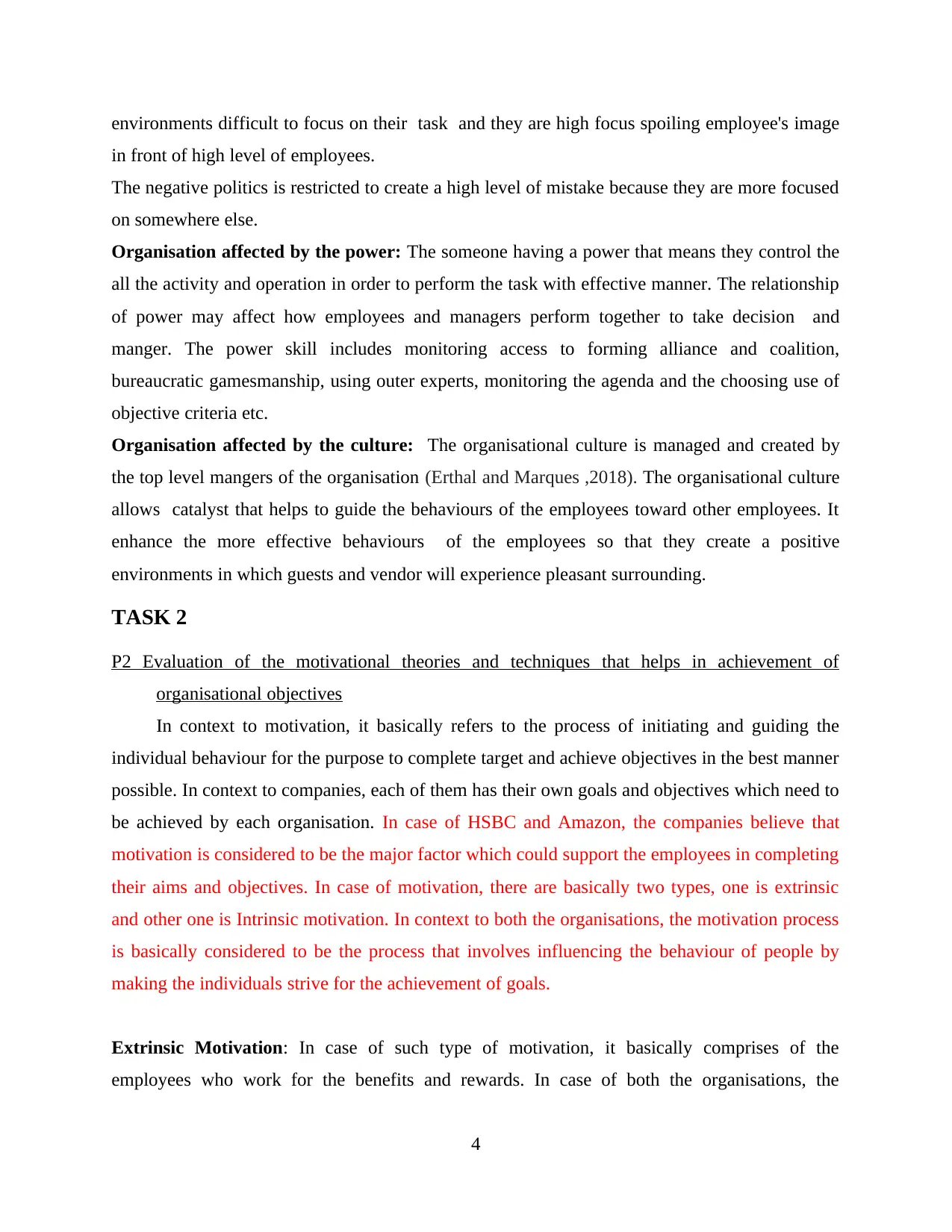
environments difficult to focus on their task and they are high focus spoiling employee's image
in front of high level of employees.
The negative politics is restricted to create a high level of mistake because they are more focused
on somewhere else.
Organisation affected by the power: The someone having a power that means they control the
all the activity and operation in order to perform the task with effective manner. The relationship
of power may affect how employees and managers perform together to take decision and
manger. The power skill includes monitoring access to forming alliance and coalition,
bureaucratic gamesmanship, using outer experts, monitoring the agenda and the choosing use of
objective criteria etc.
Organisation affected by the culture: The organisational culture is managed and created by
the top level mangers of the organisation (Erthal and Marques ,2018). The organisational culture
allows catalyst that helps to guide the behaviours of the employees toward other employees. It
enhance the more effective behaviours of the employees so that they create a positive
environments in which guests and vendor will experience pleasant surrounding.
TASK 2
P2 Evaluation of the motivational theories and techniques that helps in achievement of
organisational objectives
In context to motivation, it basically refers to the process of initiating and guiding the
individual behaviour for the purpose to complete target and achieve objectives in the best manner
possible. In context to companies, each of them has their own goals and objectives which need to
be achieved by each organisation. In case of HSBC and Amazon, the companies believe that
motivation is considered to be the major factor which could support the employees in completing
their aims and objectives. In case of motivation, there are basically two types, one is extrinsic
and other one is Intrinsic motivation. In context to both the organisations, the motivation process
is basically considered to be the process that involves influencing the behaviour of people by
making the individuals strive for the achievement of goals.
Extrinsic Motivation: In case of such type of motivation, it basically comprises of the
employees who work for the benefits and rewards. In case of both the organisations, the
4
in front of high level of employees.
The negative politics is restricted to create a high level of mistake because they are more focused
on somewhere else.
Organisation affected by the power: The someone having a power that means they control the
all the activity and operation in order to perform the task with effective manner. The relationship
of power may affect how employees and managers perform together to take decision and
manger. The power skill includes monitoring access to forming alliance and coalition,
bureaucratic gamesmanship, using outer experts, monitoring the agenda and the choosing use of
objective criteria etc.
Organisation affected by the culture: The organisational culture is managed and created by
the top level mangers of the organisation (Erthal and Marques ,2018). The organisational culture
allows catalyst that helps to guide the behaviours of the employees toward other employees. It
enhance the more effective behaviours of the employees so that they create a positive
environments in which guests and vendor will experience pleasant surrounding.
TASK 2
P2 Evaluation of the motivational theories and techniques that helps in achievement of
organisational objectives
In context to motivation, it basically refers to the process of initiating and guiding the
individual behaviour for the purpose to complete target and achieve objectives in the best manner
possible. In context to companies, each of them has their own goals and objectives which need to
be achieved by each organisation. In case of HSBC and Amazon, the companies believe that
motivation is considered to be the major factor which could support the employees in completing
their aims and objectives. In case of motivation, there are basically two types, one is extrinsic
and other one is Intrinsic motivation. In context to both the organisations, the motivation process
is basically considered to be the process that involves influencing the behaviour of people by
making the individuals strive for the achievement of goals.
Extrinsic Motivation: In case of such type of motivation, it basically comprises of the
employees who work for the benefits and rewards. In case of both the organisations, the
4
⊘ This is a preview!⊘
Do you want full access?
Subscribe today to unlock all pages.

Trusted by 1+ million students worldwide
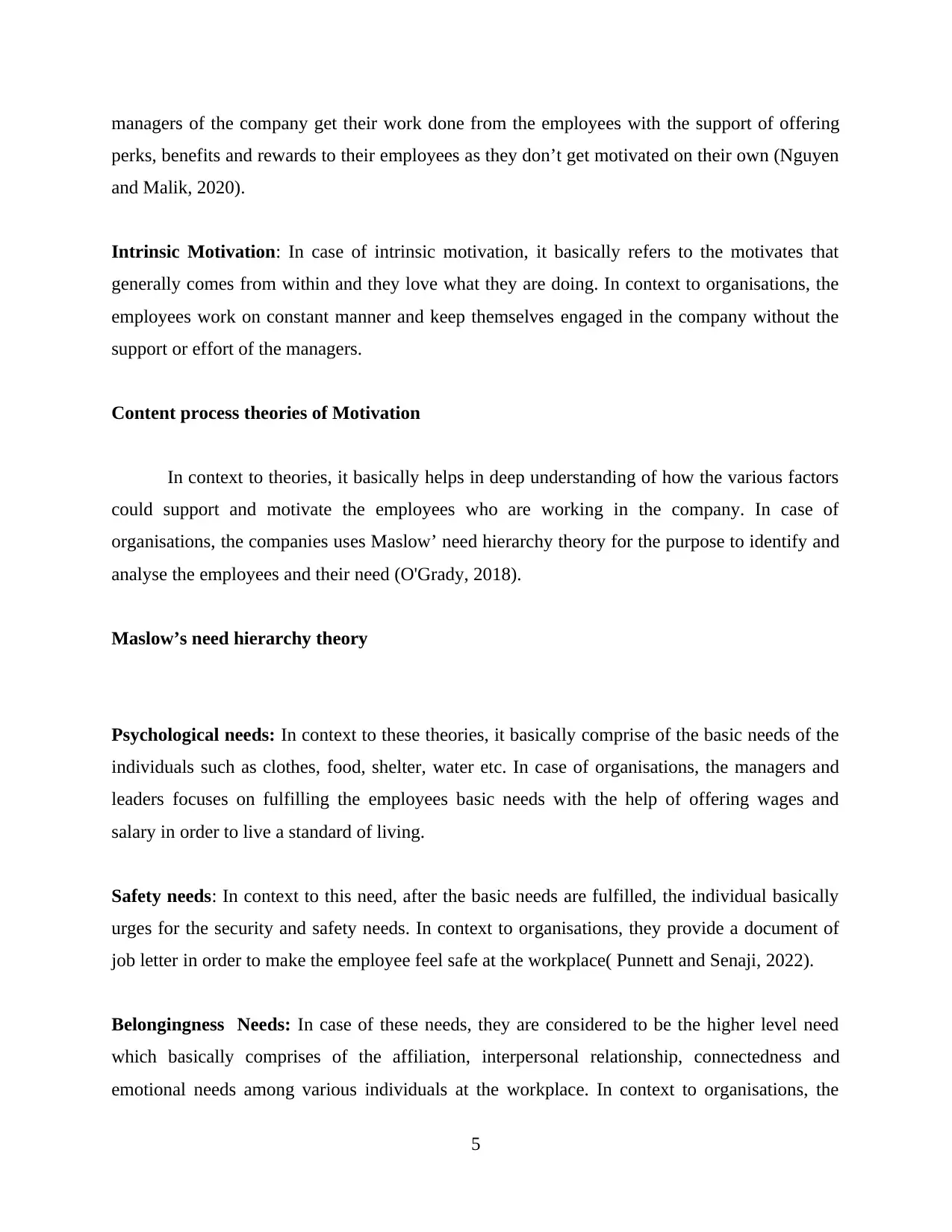
managers of the company get their work done from the employees with the support of offering
perks, benefits and rewards to their employees as they don’t get motivated on their own (Nguyen
and Malik, 2020).
Intrinsic Motivation: In case of intrinsic motivation, it basically refers to the motivates that
generally comes from within and they love what they are doing. In context to organisations, the
employees work on constant manner and keep themselves engaged in the company without the
support or effort of the managers.
Content process theories of Motivation
In context to theories, it basically helps in deep understanding of how the various factors
could support and motivate the employees who are working in the company. In case of
organisations, the companies uses Maslow’ need hierarchy theory for the purpose to identify and
analyse the employees and their need (O'Grady, 2018).
Maslow’s need hierarchy theory
Psychological needs: In context to these theories, it basically comprise of the basic needs of the
individuals such as clothes, food, shelter, water etc. In case of organisations, the managers and
leaders focuses on fulfilling the employees basic needs with the help of offering wages and
salary in order to live a standard of living.
Safety needs: In context to this need, after the basic needs are fulfilled, the individual basically
urges for the security and safety needs. In context to organisations, they provide a document of
job letter in order to make the employee feel safe at the workplace( Punnett and Senaji, 2022).
Belongingness Needs: In case of these needs, they are considered to be the higher level need
which basically comprises of the affiliation, interpersonal relationship, connectedness and
emotional needs among various individuals at the workplace. In context to organisations, the
5
perks, benefits and rewards to their employees as they don’t get motivated on their own (Nguyen
and Malik, 2020).
Intrinsic Motivation: In case of intrinsic motivation, it basically refers to the motivates that
generally comes from within and they love what they are doing. In context to organisations, the
employees work on constant manner and keep themselves engaged in the company without the
support or effort of the managers.
Content process theories of Motivation
In context to theories, it basically helps in deep understanding of how the various factors
could support and motivate the employees who are working in the company. In case of
organisations, the companies uses Maslow’ need hierarchy theory for the purpose to identify and
analyse the employees and their need (O'Grady, 2018).
Maslow’s need hierarchy theory
Psychological needs: In context to these theories, it basically comprise of the basic needs of the
individuals such as clothes, food, shelter, water etc. In case of organisations, the managers and
leaders focuses on fulfilling the employees basic needs with the help of offering wages and
salary in order to live a standard of living.
Safety needs: In context to this need, after the basic needs are fulfilled, the individual basically
urges for the security and safety needs. In context to organisations, they provide a document of
job letter in order to make the employee feel safe at the workplace( Punnett and Senaji, 2022).
Belongingness Needs: In case of these needs, they are considered to be the higher level need
which basically comprises of the affiliation, interpersonal relationship, connectedness and
emotional needs among various individuals at the workplace. In context to organisations, the
5
Paraphrase This Document
Need a fresh take? Get an instant paraphrase of this document with our AI Paraphraser
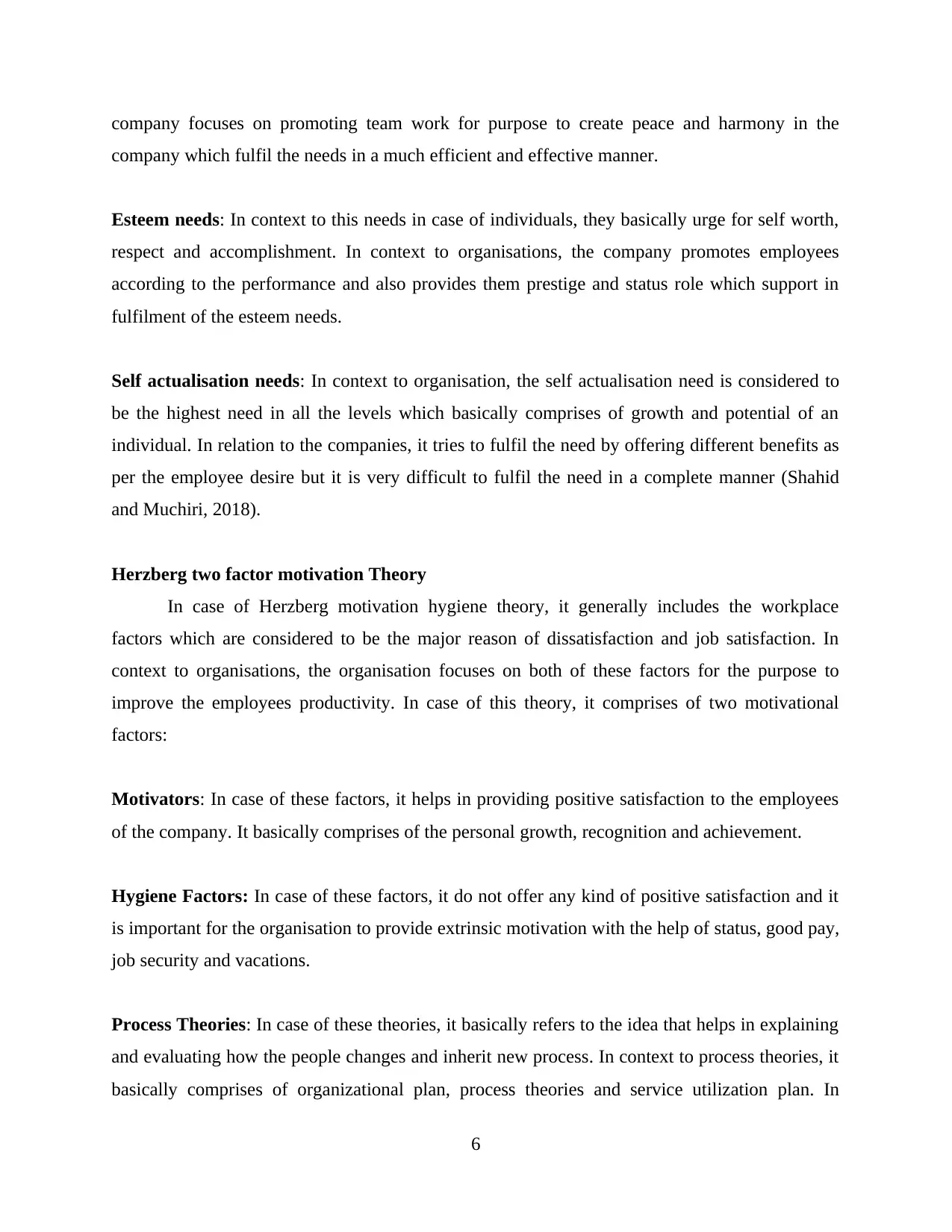
company focuses on promoting team work for purpose to create peace and harmony in the
company which fulfil the needs in a much efficient and effective manner.
Esteem needs: In context to this needs in case of individuals, they basically urge for self worth,
respect and accomplishment. In context to organisations, the company promotes employees
according to the performance and also provides them prestige and status role which support in
fulfilment of the esteem needs.
Self actualisation needs: In context to organisation, the self actualisation need is considered to
be the highest need in all the levels which basically comprises of growth and potential of an
individual. In relation to the companies, it tries to fulfil the need by offering different benefits as
per the employee desire but it is very difficult to fulfil the need in a complete manner (Shahid
and Muchiri, 2018).
Herzberg two factor motivation Theory
In case of Herzberg motivation hygiene theory, it generally includes the workplace
factors which are considered to be the major reason of dissatisfaction and job satisfaction. In
context to organisations, the organisation focuses on both of these factors for the purpose to
improve the employees productivity. In case of this theory, it comprises of two motivational
factors:
Motivators: In case of these factors, it helps in providing positive satisfaction to the employees
of the company. It basically comprises of the personal growth, recognition and achievement.
Hygiene Factors: In case of these factors, it do not offer any kind of positive satisfaction and it
is important for the organisation to provide extrinsic motivation with the help of status, good pay,
job security and vacations.
Process Theories: In case of these theories, it basically refers to the idea that helps in explaining
and evaluating how the people changes and inherit new process. In context to process theories, it
basically comprises of organizational plan, process theories and service utilization plan. In
6
company which fulfil the needs in a much efficient and effective manner.
Esteem needs: In context to this needs in case of individuals, they basically urge for self worth,
respect and accomplishment. In context to organisations, the company promotes employees
according to the performance and also provides them prestige and status role which support in
fulfilment of the esteem needs.
Self actualisation needs: In context to organisation, the self actualisation need is considered to
be the highest need in all the levels which basically comprises of growth and potential of an
individual. In relation to the companies, it tries to fulfil the need by offering different benefits as
per the employee desire but it is very difficult to fulfil the need in a complete manner (Shahid
and Muchiri, 2018).
Herzberg two factor motivation Theory
In case of Herzberg motivation hygiene theory, it generally includes the workplace
factors which are considered to be the major reason of dissatisfaction and job satisfaction. In
context to organisations, the organisation focuses on both of these factors for the purpose to
improve the employees productivity. In case of this theory, it comprises of two motivational
factors:
Motivators: In case of these factors, it helps in providing positive satisfaction to the employees
of the company. It basically comprises of the personal growth, recognition and achievement.
Hygiene Factors: In case of these factors, it do not offer any kind of positive satisfaction and it
is important for the organisation to provide extrinsic motivation with the help of status, good pay,
job security and vacations.
Process Theories: In case of these theories, it basically refers to the idea that helps in explaining
and evaluating how the people changes and inherit new process. In context to process theories, it
basically comprises of organizational plan, process theories and service utilization plan. In
6
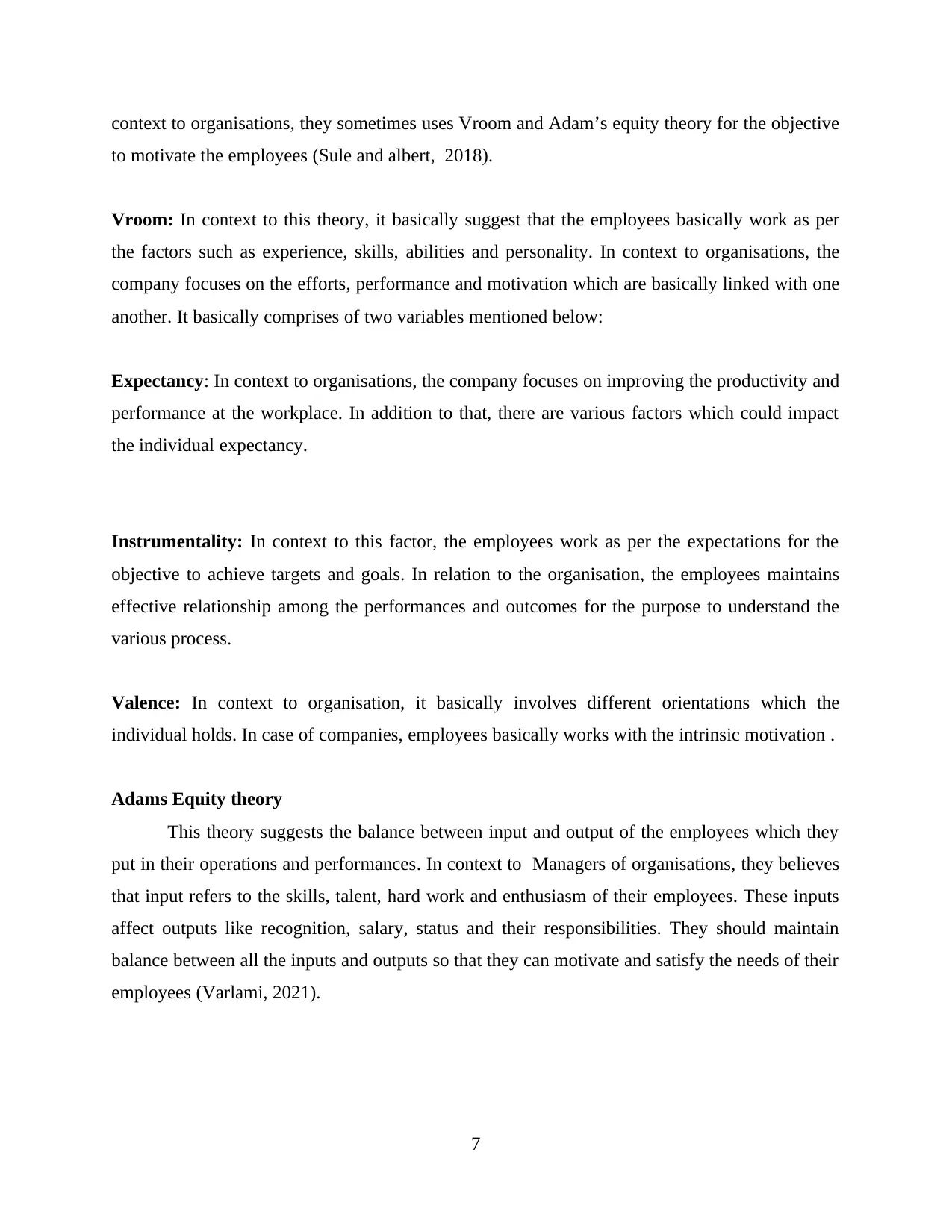
context to organisations, they sometimes uses Vroom and Adam’s equity theory for the objective
to motivate the employees (Sule and albert, 2018).
Vroom: In context to this theory, it basically suggest that the employees basically work as per
the factors such as experience, skills, abilities and personality. In context to organisations, the
company focuses on the efforts, performance and motivation which are basically linked with one
another. It basically comprises of two variables mentioned below:
Expectancy: In context to organisations, the company focuses on improving the productivity and
performance at the workplace. In addition to that, there are various factors which could impact
the individual expectancy.
Instrumentality: In context to this factor, the employees work as per the expectations for the
objective to achieve targets and goals. In relation to the organisation, the employees maintains
effective relationship among the performances and outcomes for the purpose to understand the
various process.
Valence: In context to organisation, it basically involves different orientations which the
individual holds. In case of companies, employees basically works with the intrinsic motivation .
Adams Equity theory
This theory suggests the balance between input and output of the employees which they
put in their operations and performances. In context to Managers of organisations, they believes
that input refers to the skills, talent, hard work and enthusiasm of their employees. These inputs
affect outputs like recognition, salary, status and their responsibilities. They should maintain
balance between all the inputs and outputs so that they can motivate and satisfy the needs of their
employees (Varlami, 2021).
7
to motivate the employees (Sule and albert, 2018).
Vroom: In context to this theory, it basically suggest that the employees basically work as per
the factors such as experience, skills, abilities and personality. In context to organisations, the
company focuses on the efforts, performance and motivation which are basically linked with one
another. It basically comprises of two variables mentioned below:
Expectancy: In context to organisations, the company focuses on improving the productivity and
performance at the workplace. In addition to that, there are various factors which could impact
the individual expectancy.
Instrumentality: In context to this factor, the employees work as per the expectations for the
objective to achieve targets and goals. In relation to the organisation, the employees maintains
effective relationship among the performances and outcomes for the purpose to understand the
various process.
Valence: In context to organisation, it basically involves different orientations which the
individual holds. In case of companies, employees basically works with the intrinsic motivation .
Adams Equity theory
This theory suggests the balance between input and output of the employees which they
put in their operations and performances. In context to Managers of organisations, they believes
that input refers to the skills, talent, hard work and enthusiasm of their employees. These inputs
affect outputs like recognition, salary, status and their responsibilities. They should maintain
balance between all the inputs and outputs so that they can motivate and satisfy the needs of their
employees (Varlami, 2021).
7
⊘ This is a preview!⊘
Do you want full access?
Subscribe today to unlock all pages.

Trusted by 1+ million students worldwide
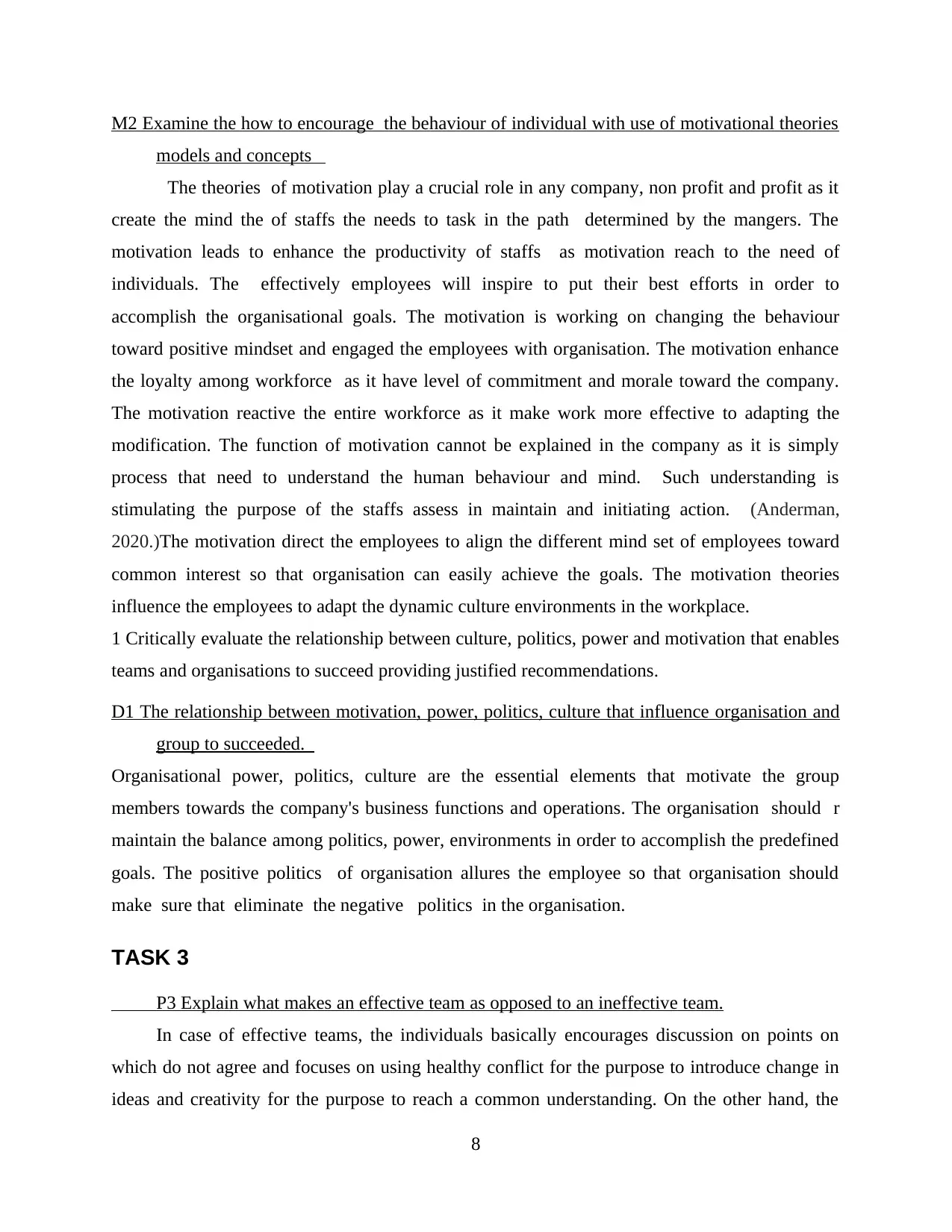
M2 Examine the how to encourage the behaviour of individual with use of motivational theories
models and concepts
The theories of motivation play a crucial role in any company, non profit and profit as it
create the mind the of staffs the needs to task in the path determined by the mangers. The
motivation leads to enhance the productivity of staffs as motivation reach to the need of
individuals. The effectively employees will inspire to put their best efforts in order to
accomplish the organisational goals. The motivation is working on changing the behaviour
toward positive mindset and engaged the employees with organisation. The motivation enhance
the loyalty among workforce as it have level of commitment and morale toward the company.
The motivation reactive the entire workforce as it make work more effective to adapting the
modification. The function of motivation cannot be explained in the company as it is simply
process that need to understand the human behaviour and mind. Such understanding is
stimulating the purpose of the staffs assess in maintain and initiating action. (Anderman,
2020.)The motivation direct the employees to align the different mind set of employees toward
common interest so that organisation can easily achieve the goals. The motivation theories
influence the employees to adapt the dynamic culture environments in the workplace.
1 Critically evaluate the relationship between culture, politics, power and motivation that enables
teams and organisations to succeed providing justified recommendations.
D1 The relationship between motivation, power, politics, culture that influence organisation and
group to succeeded.
Organisational power, politics, culture are the essential elements that motivate the group
members towards the company's business functions and operations. The organisation should r
maintain the balance among politics, power, environments in order to accomplish the predefined
goals. The positive politics of organisation allures the employee so that organisation should
make sure that eliminate the negative politics in the organisation.
TASK 3
P3 Explain what makes an effective team as opposed to an ineffective team.
In case of effective teams, the individuals basically encourages discussion on points on
which do not agree and focuses on using healthy conflict for the purpose to introduce change in
ideas and creativity for the purpose to reach a common understanding. On the other hand, the
8
models and concepts
The theories of motivation play a crucial role in any company, non profit and profit as it
create the mind the of staffs the needs to task in the path determined by the mangers. The
motivation leads to enhance the productivity of staffs as motivation reach to the need of
individuals. The effectively employees will inspire to put their best efforts in order to
accomplish the organisational goals. The motivation is working on changing the behaviour
toward positive mindset and engaged the employees with organisation. The motivation enhance
the loyalty among workforce as it have level of commitment and morale toward the company.
The motivation reactive the entire workforce as it make work more effective to adapting the
modification. The function of motivation cannot be explained in the company as it is simply
process that need to understand the human behaviour and mind. Such understanding is
stimulating the purpose of the staffs assess in maintain and initiating action. (Anderman,
2020.)The motivation direct the employees to align the different mind set of employees toward
common interest so that organisation can easily achieve the goals. The motivation theories
influence the employees to adapt the dynamic culture environments in the workplace.
1 Critically evaluate the relationship between culture, politics, power and motivation that enables
teams and organisations to succeed providing justified recommendations.
D1 The relationship between motivation, power, politics, culture that influence organisation and
group to succeeded.
Organisational power, politics, culture are the essential elements that motivate the group
members towards the company's business functions and operations. The organisation should r
maintain the balance among politics, power, environments in order to accomplish the predefined
goals. The positive politics of organisation allures the employee so that organisation should
make sure that eliminate the negative politics in the organisation.
TASK 3
P3 Explain what makes an effective team as opposed to an ineffective team.
In case of effective teams, the individuals basically encourages discussion on points on
which do not agree and focuses on using healthy conflict for the purpose to introduce change in
ideas and creativity for the purpose to reach a common understanding. On the other hand, the
8
Paraphrase This Document
Need a fresh take? Get an instant paraphrase of this document with our AI Paraphraser
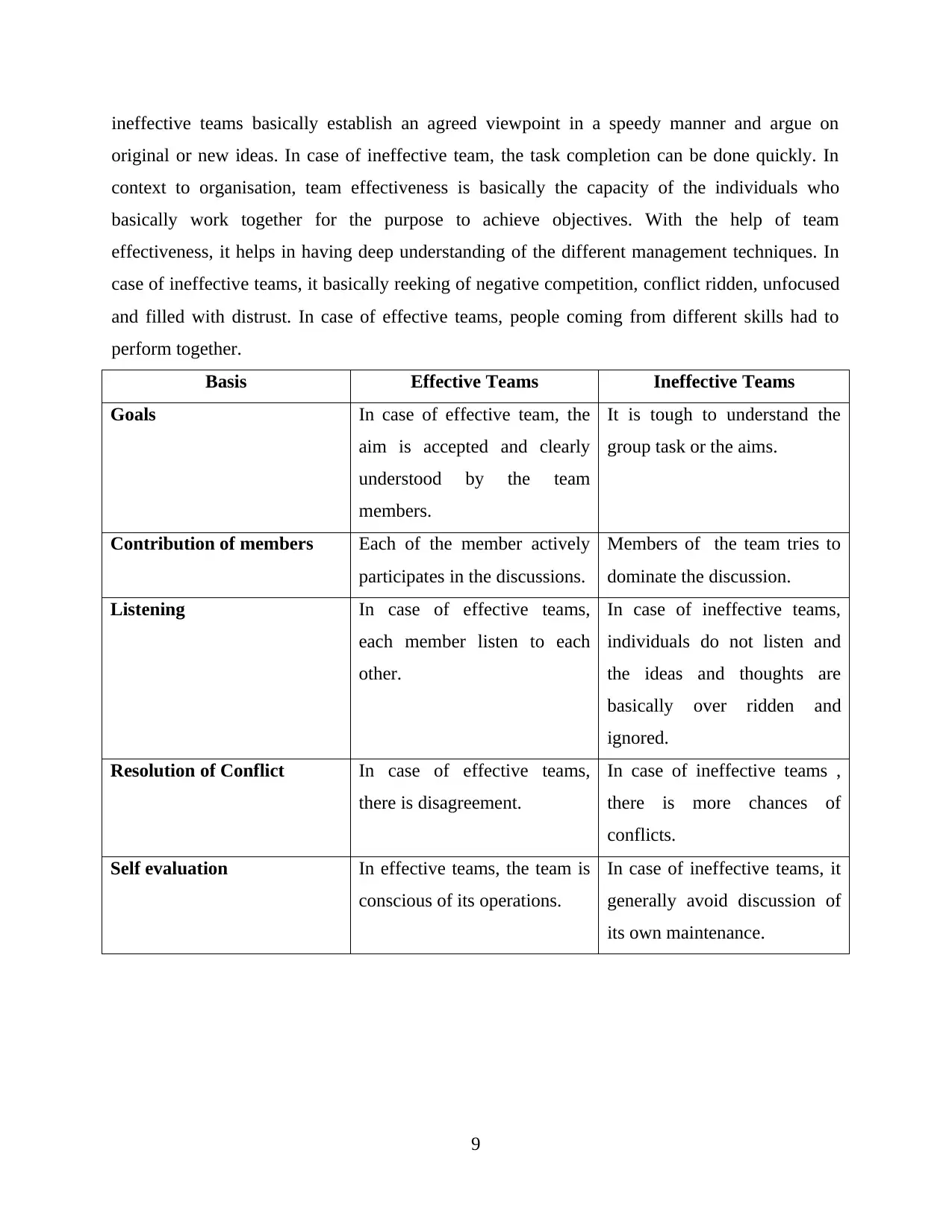
ineffective teams basically establish an agreed viewpoint in a speedy manner and argue on
original or new ideas. In case of ineffective team, the task completion can be done quickly. In
context to organisation, team effectiveness is basically the capacity of the individuals who
basically work together for the purpose to achieve objectives. With the help of team
effectiveness, it helps in having deep understanding of the different management techniques. In
case of ineffective teams, it basically reeking of negative competition, conflict ridden, unfocused
and filled with distrust. In case of effective teams, people coming from different skills had to
perform together.
Basis Effective Teams Ineffective Teams
Goals In case of effective team, the
aim is accepted and clearly
understood by the team
members.
It is tough to understand the
group task or the aims.
Contribution of members Each of the member actively
participates in the discussions.
Members of the team tries to
dominate the discussion.
Listening In case of effective teams,
each member listen to each
other.
In case of ineffective teams,
individuals do not listen and
the ideas and thoughts are
basically over ridden and
ignored.
Resolution of Conflict In case of effective teams,
there is disagreement.
In case of ineffective teams ,
there is more chances of
conflicts.
Self evaluation In effective teams, the team is
conscious of its operations.
In case of ineffective teams, it
generally avoid discussion of
its own maintenance.
9
original or new ideas. In case of ineffective team, the task completion can be done quickly. In
context to organisation, team effectiveness is basically the capacity of the individuals who
basically work together for the purpose to achieve objectives. With the help of team
effectiveness, it helps in having deep understanding of the different management techniques. In
case of ineffective teams, it basically reeking of negative competition, conflict ridden, unfocused
and filled with distrust. In case of effective teams, people coming from different skills had to
perform together.
Basis Effective Teams Ineffective Teams
Goals In case of effective team, the
aim is accepted and clearly
understood by the team
members.
It is tough to understand the
group task or the aims.
Contribution of members Each of the member actively
participates in the discussions.
Members of the team tries to
dominate the discussion.
Listening In case of effective teams,
each member listen to each
other.
In case of ineffective teams,
individuals do not listen and
the ideas and thoughts are
basically over ridden and
ignored.
Resolution of Conflict In case of effective teams,
there is disagreement.
In case of ineffective teams ,
there is more chances of
conflicts.
Self evaluation In effective teams, the team is
conscious of its operations.
In case of ineffective teams, it
generally avoid discussion of
its own maintenance.
9
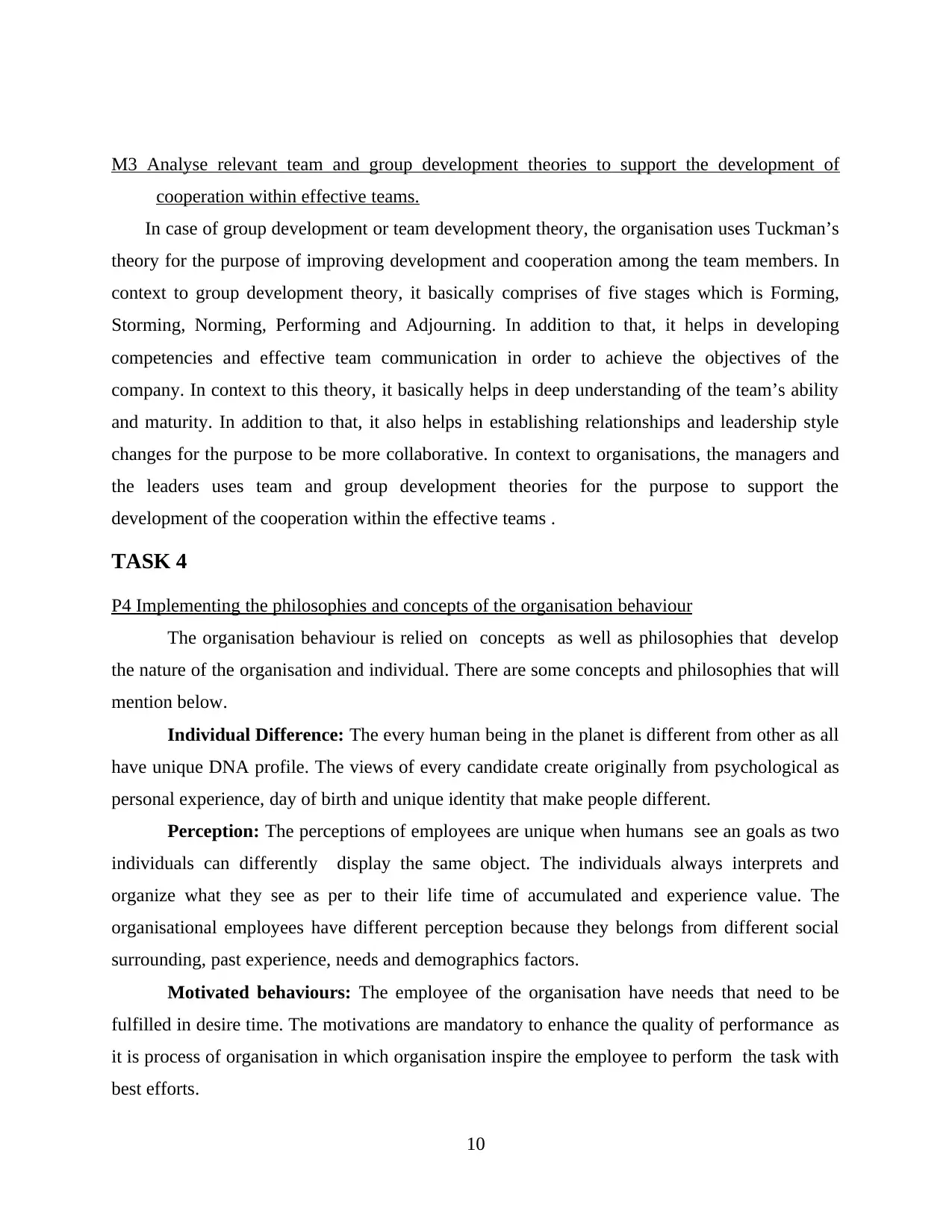
M3 Analyse relevant team and group development theories to support the development of
cooperation within effective teams.
In case of group development or team development theory, the organisation uses Tuckman’s
theory for the purpose of improving development and cooperation among the team members. In
context to group development theory, it basically comprises of five stages which is Forming,
Storming, Norming, Performing and Adjourning. In addition to that, it helps in developing
competencies and effective team communication in order to achieve the objectives of the
company. In context to this theory, it basically helps in deep understanding of the team’s ability
and maturity. In addition to that, it also helps in establishing relationships and leadership style
changes for the purpose to be more collaborative. In context to organisations, the managers and
the leaders uses team and group development theories for the purpose to support the
development of the cooperation within the effective teams .
TASK 4
P4 Implementing the philosophies and concepts of the organisation behaviour
The organisation behaviour is relied on concepts as well as philosophies that develop
the nature of the organisation and individual. There are some concepts and philosophies that will
mention below.
Individual Difference: The every human being in the planet is different from other as all
have unique DNA profile. The views of every candidate create originally from psychological as
personal experience, day of birth and unique identity that make people different.
Perception: The perceptions of employees are unique when humans see an goals as two
individuals can differently display the same object. The individuals always interprets and
organize what they see as per to their life time of accumulated and experience value. The
organisational employees have different perception because they belongs from different social
surrounding, past experience, needs and demographics factors.
Motivated behaviours: The employee of the organisation have needs that need to be
fulfilled in desire time. The motivations are mandatory to enhance the quality of performance as
it is process of organisation in which organisation inspire the employee to perform the task with
best efforts.
10
cooperation within effective teams.
In case of group development or team development theory, the organisation uses Tuckman’s
theory for the purpose of improving development and cooperation among the team members. In
context to group development theory, it basically comprises of five stages which is Forming,
Storming, Norming, Performing and Adjourning. In addition to that, it helps in developing
competencies and effective team communication in order to achieve the objectives of the
company. In context to this theory, it basically helps in deep understanding of the team’s ability
and maturity. In addition to that, it also helps in establishing relationships and leadership style
changes for the purpose to be more collaborative. In context to organisations, the managers and
the leaders uses team and group development theories for the purpose to support the
development of the cooperation within the effective teams .
TASK 4
P4 Implementing the philosophies and concepts of the organisation behaviour
The organisation behaviour is relied on concepts as well as philosophies that develop
the nature of the organisation and individual. There are some concepts and philosophies that will
mention below.
Individual Difference: The every human being in the planet is different from other as all
have unique DNA profile. The views of every candidate create originally from psychological as
personal experience, day of birth and unique identity that make people different.
Perception: The perceptions of employees are unique when humans see an goals as two
individuals can differently display the same object. The individuals always interprets and
organize what they see as per to their life time of accumulated and experience value. The
organisational employees have different perception because they belongs from different social
surrounding, past experience, needs and demographics factors.
Motivated behaviours: The employee of the organisation have needs that need to be
fulfilled in desire time. The motivations are mandatory to enhance the quality of performance as
it is process of organisation in which organisation inspire the employee to perform the task with
best efforts.
10
⊘ This is a preview!⊘
Do you want full access?
Subscribe today to unlock all pages.

Trusted by 1+ million students worldwide
1 out of 16
Related Documents
Your All-in-One AI-Powered Toolkit for Academic Success.
+13062052269
info@desklib.com
Available 24*7 on WhatsApp / Email
![[object Object]](/_next/static/media/star-bottom.7253800d.svg)
Unlock your academic potential
Copyright © 2020–2025 A2Z Services. All Rights Reserved. Developed and managed by ZUCOL.


